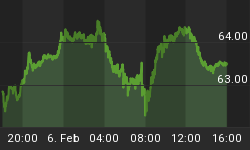The New Chairperson of the Federal Reserve showed off her dovish feathers after the latest meeting of the FOMC. Ms. Yellen abrogated the threshold of 6.5% on the unemployment rate as the starting point for short term rate hikes and replaced it with amorphous and ambiguous language that allows plenty of wiggle room with rates.
Just like a child sometimes changes the rules of a game in mid-stream in order to guarantee a favorable outcome, the Fed has ripped up the rulebook to suit its own needs.
The Fed was fully aware when it first stipulated its guidelines for starting rate hikes, that a 6.5% unemployment rate threshold could be breached with the help of a contraction in the labor force participation rate and not fully through increased hiring. However, it still drew a line in the sand in which investors were forced to determine when the cost of borrowing money would begin to be increased directly by the central bank.
To the central bank's credit it did follow through on the promised continued reduction of asset purchases by $10 billion per month. The Fed is now purchasing $30 billion in Treasuries and $25 billion worth of MBS. This reduction was already in the cards and didn't surprise anyone. Nevertheless, the Fed completely abolished a numerical threshold for the unemployment rate to fall below before it begins to raise the Fed Funds Rate. The reason for this is clear; the Fed realizes it cannot raise short-term rates without pricking the asset bubbles it has worked so hard at creating and sending the economy into a deflationary tailspin.
The condition of the U.S. economy (and indeed global GDP as a whole) is so anemic that even after 5+ years of massive Federal Reserve market manipulations, the Fed cannot raise short-term interest rates. In other words, they will keep making excuses as to why they can't raise interest rates and continue to move the goal posts for their convenience.
The Fed is in the process of trying to end QE, but the stock market and Fed don't yet realize that the tapering of asset purchases is tightening monetary policy. This will cause long-term interest rates to rise-and the worst is still to come. For instance, the 10-Year jumped to 2.77%, from 2.68% on the same day of FOMC's decision to reduce asset purchases by another $10 billion. And short-term rates are rising to an even greater extent, despite the fact that the Fed is still posting a bid of $55 billion each month for these debt instruments.
The Federal Reserve's quantitative easing program was the only reason why the 10-Year Note, and longer-term interest rates in general, are as low as they are today. Ending QE will cause a huge spike at the long-end of the yield curve unless the economy is sharply contracting. Whether or not the Fed admits this is irrelevant.
The fact is the Fed is going from buying all of the newly issued Treasury debt, to zero of the newly issued debt market. And there isn't any entity that I am aware of in the entire world that will supplant the Fed's purchases at anywhere near today's rates. So interest rates are going to rise, and that is deflationary and also bullish for the U.S. dollar in the short-term.
But the anemic economic data should continue to worsen as interest rates rise. This means that the Fed will stop tapering sometime in the very near future -- probably in the summer or early fall -- and then they will feel compelled to launch QE V. When this shift in policy takes place it will be incredibly significant for world markets--beyond anything we have seen before.
In the interim, investors that have bet on an easy escape from QE will find out how wrong they have been. The equity market should undergo a severe correction once it becomes clear that asset prices and the economy have been highly reliant on debt monetization from the Fed.
The gold market has priced in a worst case scenario for the yellow metal--a balanced budget and no growth in the money supply. That's clearly not going to happen. In fact, the opposite is much more likely to occur. However, as I've stated many times before, the major move higher in precious metals won't occur until the overwhelmingly-accepted notion regarding the Fed's ability to end QE and raise interest rates with full impunity is proven to be fantasy.
Therefore, a significant spike in hard asset values will occur when the Fed acknowledges the fact that there is no easy escape from QE and the economy is destined to head into a deflationary collapse without the Fed's continuous support of bond prices. Although that would be healthy for the economy in the long term, it isn't going to happen voluntarily because of the hubris of politicians and their constituents. The Fed will stop tapering and undergo a massive and extended QE program in the latter part of 2014. That is when investors need to go all-in on inflation hedged securities. Until then, it is prudent to hold an abnormally high level of cash in your portfolio to be able to take advantage of the coming selloff.















